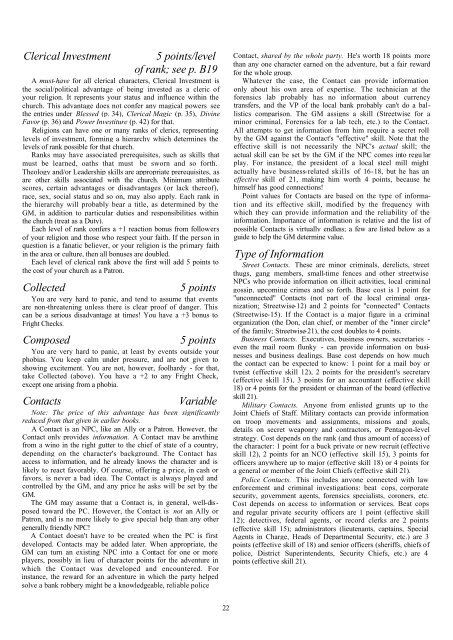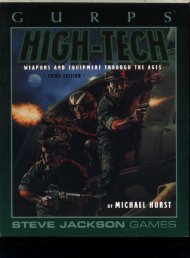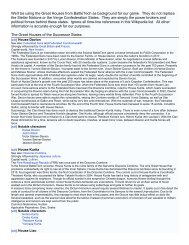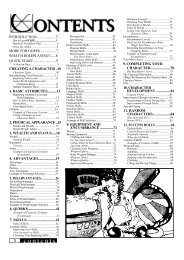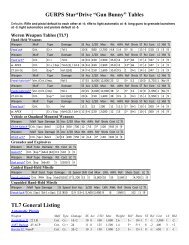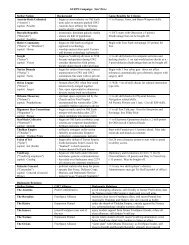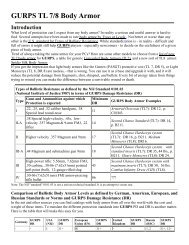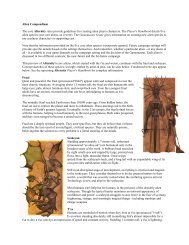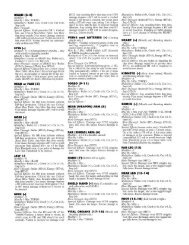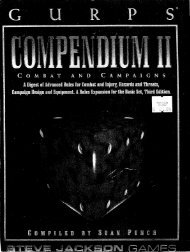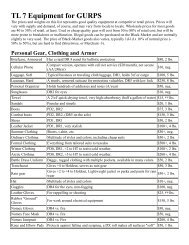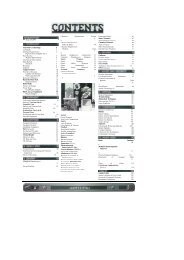GURPS - Compendium 1..
GURPS - Compendium 1..
GURPS - Compendium 1..
You also want an ePaper? Increase the reach of your titles
YUMPU automatically turns print PDFs into web optimized ePapers that Google loves.
Clerical Investment 5 points/level<br />
of rank; see p. B19<br />
A must-have for all clerical characters, Clerical Investment is<br />
the social/political advantage of being invested as a cleric of<br />
your religion. It represents your status and influence within the<br />
church. This advantage does not confer any magical powers see<br />
the entries under Blessed (p. 34), Clerical Magic (p. 35), Divine<br />
Favor (p. 36) and Power Investiture (p. 42) for that.<br />
Religions can have one or many ranks of clerics, representing<br />
levels of investment, forming a hierarchy which determines the<br />
levels of rank possible for that church.<br />
Ranks may have associated prerequisites, such as skills that<br />
must be learned, oaths that must be sworn and so forth.<br />
Theology and/or Leadership skills are appropriate prerequisites, as<br />
are other skills associated with the church. Minimum attribute<br />
scores, certain advantages or disadvantages (or lack thereof),<br />
race, sex, social status and so on, may also apply. Each rank in<br />
the hierarchy will probably bear a title, as determined by the<br />
GM, in addition to particular duties and responsibilities within<br />
the church (treat as a Duty).<br />
Each level of rank confers a +1 reaction bonus from followers<br />
of your religion and those who respect your faith. If the person in<br />
question is a fanatic believer, or your religion is the primary faith<br />
in the area or culture, then all bonuses are doubled.<br />
Each level of clerical rank above the first will add 5 points to<br />
the cost of your church as a Patron.<br />
Collected<br />
5 points<br />
You are very hard to panic, and tend to assume that events<br />
are non-threatening unless there is clear proof of danger. This<br />
can be a serious disadvantage at times! You have a +3 bonus to<br />
Fright Checks.<br />
Composed<br />
5 points<br />
You are very hard to panic, at least by events outside your<br />
phobias. You keep calm under pressure, and are not given to<br />
showing excitement. You are not, however, foolhardy - for that,<br />
take Collected (above). You have a +2 to any Fright Check,<br />
except one arising from a phobia.<br />
Contacts<br />
Variable<br />
Note: The price of this advantage has been significantly<br />
reduced from that given in earlier books.<br />
A Contact is an NPC, like an Ally or a Patron. However, the<br />
Contact only provides information. A Contact may be anything<br />
from a wino in the right gutter to the chief of state of a country,<br />
depending on the character's background. The Contact has<br />
access to information, and he already knows the character and is<br />
likely to react favorably. Of course, offering a price, in cash or<br />
favors, is never a bad idea. The Contact is always played and<br />
controlled by the GM, and any price he asks will be set by the<br />
GM.<br />
The GM may assume that a Contact is, in general, well-dis -<br />
posed toward the PC. However, the Contact is not an Ally or<br />
Patron, and is no more likely to give special help than any other<br />
generally friendly NPC!<br />
A Contact doesn't have to be created when the PC is first<br />
developed. Contacts may be added later. When appropriate, the<br />
GM can turn an existing NPC into a Contact for one or more<br />
players, possibly in lieu of character points for the adventure in<br />
which the Contact was developed and encountered. For<br />
instance, the reward for an adventure in which the party helped<br />
solve a bank robbery might be a knowledgeable, reliable police<br />
Contact, shared by the whole party. He's worth 18 points more<br />
than any one character earned on the adventure, but a fair reward<br />
for the whole group.<br />
Whatever the case, the Contact can provide information<br />
only about his own area of expertise. The technician at the<br />
forensics lab probably has no information about currency<br />
transfers, and the VP of the local bank probably can't do a ballistics<br />
comparison. The GM assigns a skill (Streetwise for a<br />
minor criminal, Forensics for a lab tech, etc.) to the Contact.<br />
All attempts to get information from him require a secret roll<br />
by the GM against the Contact's "effective" skill. Note that the<br />
effective skill is not necessarily the NPC's actual skill; the<br />
actual skill can be set by the GM if the NPC comes into regu lar<br />
play. For instance, the president of a local steel mill might<br />
actually have business-related skills of 16-18, but he has an<br />
effective skill of 21, making him worth 4 points, because he<br />
himself has good connections!<br />
Point values for Contacts are based on the type of information<br />
and its effective skill, modified by the frequency with<br />
which they can provide information and the reliability of the<br />
information. Importance of information is relative and the list of<br />
possible Contacts is virtually endless; a few are listed below as a<br />
guide to help the GM determine value.<br />
Type of Information<br />
Street Contacts. These are minor criminals, derelicts, street<br />
thugs, gang members, small-time fences and other streetwise<br />
NPCs who provide information on illicit activities, local criminal<br />
gossip, upcoming crimes and so forth. Base cost is 1 point for<br />
"unconnected" Contacts (not part of the local criminal organization;<br />
Streetwise-12) and 2 points for "connected" Contacts<br />
(Streetwise-15). If the Contact is a major figure in a criminal<br />
organization (the Don, clan chief, or member of the "inner circle"<br />
of the family; Streetwise-21), the cost doubles to 4 points.<br />
Business Contacts. Executives, business owners, secretaries -<br />
even the mail room flunky - can provide information on businesses<br />
and business dealings. Base cost depends on how much<br />
the contact can be expected to know: 1 point for a mail boy or<br />
typist (effective skill 12), 2 points for the president's secretary<br />
(effective skill 15), 3 points for an accountant (effective skill<br />
18) or 4 points for the president or chairman of the board (effective<br />
skill 21).<br />
Military Contacts. Anyone from enlisted grunts up to the<br />
Joint Chiefs of Staff. Military contacts can provide information<br />
on troop movements and assignments, missions and goals,<br />
details on secret weaponry and contractors, or Pentagon-level<br />
strategy. Cost depends on the rank (and thus amount of access) of<br />
the character: 1 point for a buck private or new recruit (effective<br />
skill 12), 2 points for an NCO (effective skill 15), 3 points for<br />
officers anywhere up to major (effective skill 18) or 4 points for<br />
a general or member of the Joint Chiefs (effective skill 21).<br />
Police Contacts. This includes anyone connected with law<br />
enforcement and criminal investigations: beat cops, corporate<br />
security, government agents, forensics specialists, coroners, etc.<br />
Cost depends on access to information or services. Beat cops<br />
and regular private security officers are 1 point (effective skill<br />
12); detectives, federal agents, or record clerks are 2 points<br />
(effective skill 15); administrators (lieutenants, captains, Special<br />
Agents in Charge, Heads of Departmental Security, etc.) are 3<br />
points (effective skill of 18) and senior officers (sheriffs, chiefs of<br />
police, District Superintendents, Security Chiefs, etc.) are 4<br />
points (effective skill 21).<br />
22


